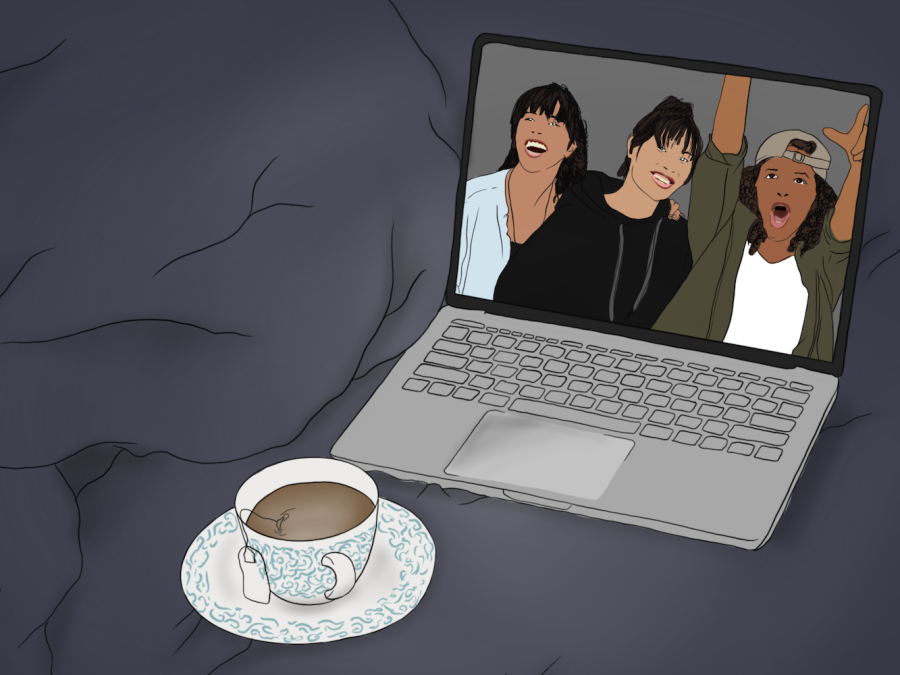Off the Radar: ‘Casablanca Beats’ explores the complex intersection of hip hop and politics
This Moroccan film doesn’t shy away from contentious discussions, examined with hip hop. “Casablanca Beats” is currently available on Kanopy.
(Illustration by Aaliya Luthra)
April 7, 2023
One of Franco Moroccan film and television director Nabil Ayouch’s most recent films, “Casablanca Beats,” returns hip hop to its roots, highlighting the genre’s capacity to incite political change. The film represented Morocco at the 2022 Oscars in the international feature film category. According to Morocco World News, Ayouch’s “aim with Casablanca Beats was to shed light on disadvantaged youngsters who blossom when arts and culture comes to their lives.”
The film follows retired rapper Anas Basbousi, who decides to launch a hip hop class in Sidi Moumen, a district of the Moroccan city Casablanca. At these free dance and rap classes, Basbousi encourages children to openly discuss political topics that may otherwise be too controversial.
The actors and characters in “Casablanca Beats” share the same names, because the actors are portraying their true selves. Many of the film’s scenes are brief and appear disconnected from each other by random cuts. The entire structure of the film alludes to the camera’s documentary-esque attempt at inconspicuously recording the lives of Anas and his artistically motivated students.
Many of the discussions in the film tackle what is and is not allowed to be talked about in rap music. Throughout the film, there is a constant tension between religion and culture. Some children believe it is inappropriate to rap about religion, while others believe that complex topics, such as wearing a hijab, must be addressed. Amid this debate, Anas declares not a solution but rather a realization that “We used to think we could change things by talking about them.”
These Moroccan children express their opinions on controversial political ideologies through rap and dance within a strictly traditional Middle Eastern society. They dance under the clothesline on rooftop balconies, rap their repressed emotions to their siblings and perform their favorite original works to their friends. However, their passion is often criticized by their own family, with clashes between independent desire and generational expectations. Anas is openly criticized for taking such a risk, as the children’s parents do not feel comfortable with the hip hop classes.
Nevertheless, Anas encourages his students to show confidence in their performances and to voice their opinions on sensitive topics. He does so honestly, without sugarcoating the harsh realities of trying to create art in a complicated world. He always gives space for his students to speak their opinions in conversation or performance, while simultaneously providing room for constructive criticism. Whether it is an open discussion about Middle Eastern misconceptions, or a personal rap about the struggle to find one’s voice as a woman, Anas ensures that there is always a way for his students to articulate their political or social opinions.
In a society in which culture and religion exist in a warring space, many are left confused about what’s really the truth and what’s mere opinion. One of the children in the film explicitly raps about his uncertainty about whether hip hop is forbidden by the religion of Islam or simply culturally unacceptable: “Yes, the line between good and evil is clear … and yet, in this class of civilizations and religions, I can’t tell what’s allowed? Forbidden? Where is the line between belief and deviance?”
There is a developing belief in society that hip hop is dying, since “a number of would-be superstars have died young”; the genre still has celebrity artists, but some believe that today’s rookie rappers don’t have what it takes to alter the rap industry. “Casablanca Beats” counters this belief that hip hop is on the decline by focusing on an underprivileged community with young aspiring rappers, learning to navigate the world.
The film openly explores the intersection of global artistic passion and country-specific politics. “Casablanca Beats” does not shy away from the reality of uncomfortable, and sometimes controversial, conversations. The film also doesn’t conclude with a satisfying solution to the religious and cultural uncertainties regarding hip hop. Instead, it leaves viewers with the message that it’s possible to create art and articulate meaning within complex situations. “Casablanca Beats” emphasizes the ability to tackle challenging subjects through open dialogue and the occasional rap and dance battle.
Contact Afnan Abbassi at [email protected].



























































































































































